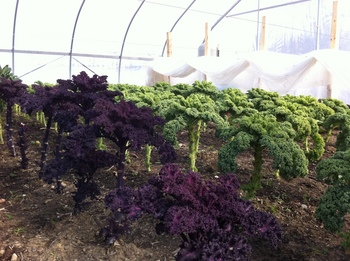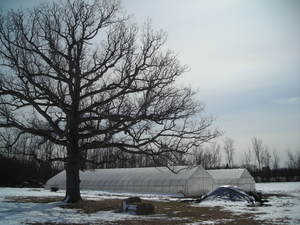Farm to Fork: A visit to Sunseed Farm
In my Farm to Fork series I visit local farms around Ann Arbor and share what I learn.

This kale was planted in August and has been feeding winter CSA members since November.
Corinna Borden | Contributor
“We believe that in order to have a really healthy food systemm we need to have a year-round supply of food. It doesn’t make sense to even talk about a food system unless you can supply food in the wintertime.”
Tomm learned about supplying food in the wintertime as the production manager for the Student Organic Farm at MSU. He and his wife, Trilby, moved to Ann Arbor and started “Ann Arbor’s first year round fresh vegetable CSA,” as noted in the “2011 Local Food Victories” awarded at the Third annual Homegrown Local Food Summit.
Supplying food all year long takes hoophouses (courtesy of Selma Cafe's Farmer Fund and the USDA), a regimented plan for the timing of plantings and an awareness of which plants to grow inside the hoop during the winter.
“We grow either plants that you can harvest a bunch of times — like the kale or chard or the salad mix —or the really space-efficient crops like lettuce, carrots or spinach.”

It felt like May inside the hoop houses — outside, well, still March.
Corinna Borden | Contributor
For example, they planted the kale in August and have been harvesting since November. As their August plantings of salad mix and turnip are beginning to bolt, they are removing them and planting new seeds for the summer harvest.
Sunseed Farm uses a variety of methods to control pests and diseases: cover crops, rotational plantings, a broad variety of vegetable species, regular dish soap to remove aphids and nematodes (a microscopic soil organism) sprayed on the soil to reduce cutworms.
“The idea of what we are working to do is to create an ecosystem in which the population of one pest/pathogen/insect is not exploding to the point where it becomes a real problem…[We are] increasing the biodiversity on our farm…to keep the insect pressure down…because when you have healthy soil you can have healthy plants. When plants have what they need they are able to resist attacks.”
Another way Sunseed Farm protects and thus feeds the soil in the hoop house is by using a broadfork to prepare the soil for planting instead of turning it over with a shovel or tilling it.
“[With a shovel] you might achieve a lot really quickly, but you are really setting back the soil biology by killing a lot of the microrganisms down in there...People have been using a broadfork for a long time, but [Eliot Coleman] brought it back.”
The 30-inch wide bar has seven long tines, and when you stand on it and wiggle it back and forth, it loosens the soil without destroying the ecosystem.
The first week of March, Tomm Becker presented at both the Homegrown Local Food Summit and at the Michigan Organic Conference. He also welcomes interns and apprentices to Sunseed Farm. “I want to help people as much as I can. I don’t really see myself in competition with other small scale vegetable farmers. I think that really what we are doing is trying to change the whole food system — helping each other is helping ourselves.”
Customers can sign up for three 16-week shares: Autumn, Winter, and Summer. Sunseed Farm is accepting applications now for their Summer CSA share (sign up here). Located five miles north of Ann Arbor off of Joy Road, you can email them or give them a call! (517-980-0893)
Corinna works with the Westside Farmers Market and writes about many things.

